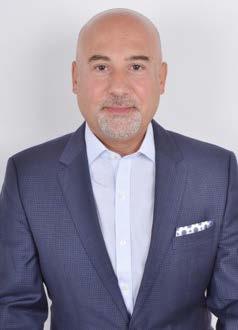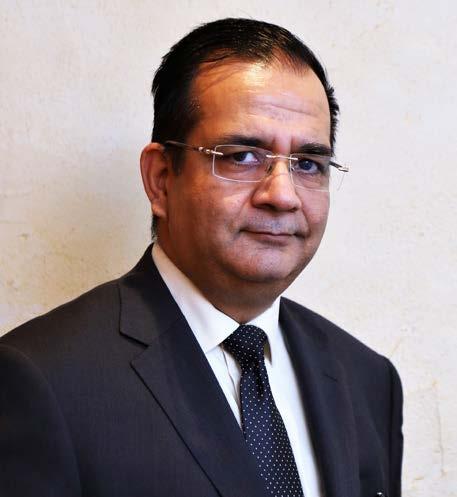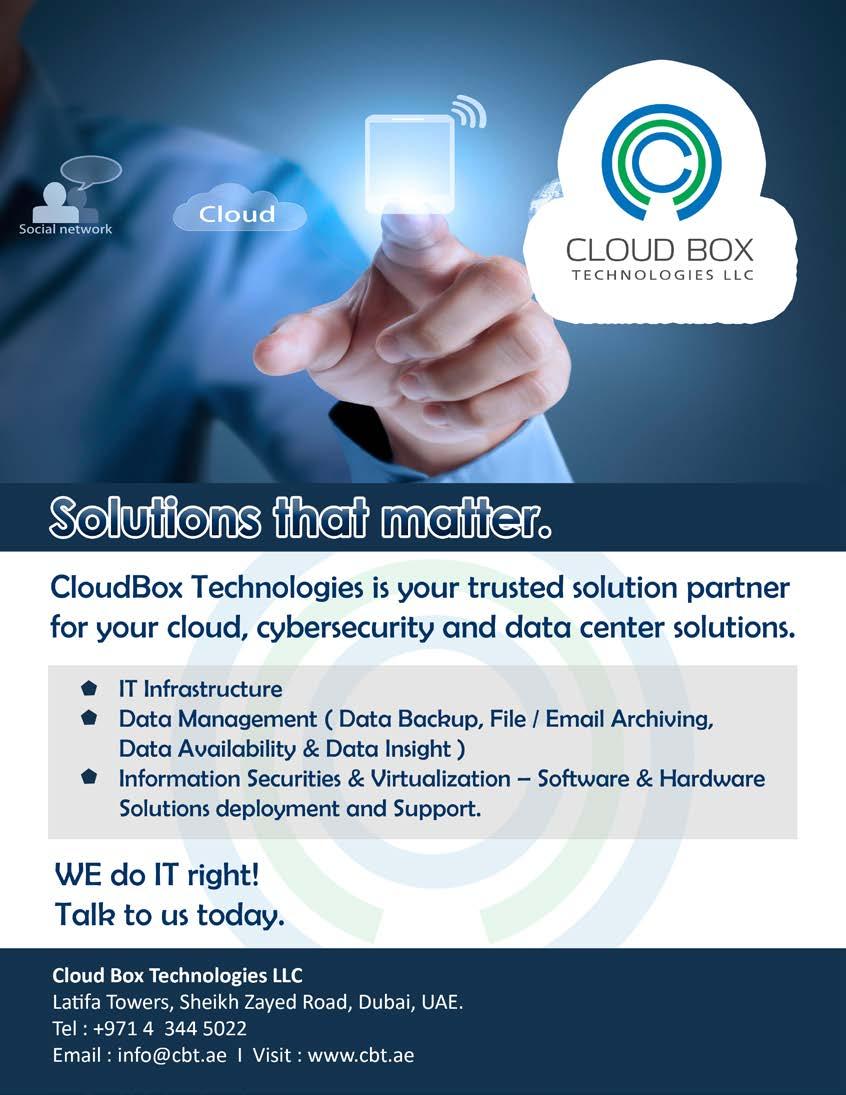
16 minute read
Equinix
EQUINIX CLOUD-FIRST DIGITAL TRANSFORMATION
CNME Editor Mark Forker managed to secure an exclusive interview with Kamel Al-Tawil, the newly appointed Managing Director, Middle East and North Africa at Equinix, to find out about his new role - and how the global data center leader is planning to utilise its expertise to capitalise on the recent surge in cloud adoption across the Gulf region.
Al-Tawil might be new to Equinix, but he certainly isn’t new to the IT industry here in the Middle East, where he is regarded as a key decision-maker and influence in the development of the IT ecosystem over the last 25 years.
He has enjoyed a career with great distinction and prior to his appointment at Equinix, Al Tawil was responsible for leading Oracle’s business applications and cloud strategy in his capacity as Vice President, before joining Oracle he also
had leadership roles with NCR and EMC.
Al-Tawil expressed his delight at joining Equinix, and praised its data center capabilities, which have recently been expanded to Oman.
“I joined Equinix in September of this year, but we have been an extremely busy over the last 3 months. We have 3 data centers in the UAE, and our flagship hub in Dubai is the most connected facility in the entire Middle East region. In addition to this, we also recently expanded our data center operations to Oman, where we opened our latest data center in Muscat, to cater to the needs of the region and build on the submarine cable density that exists in the Oman,” said Al-Tawil.
The new Managing Director at Equinix also highlighted its aspirations to drive cloudfirst digital transformation in the MENA region following the announcement with its alliance partner datamena of the ECX fabric.
“We made a number of very exciting announcements of late and the major one has been the launch of the Equinix Cloud Exchange in association with our partners datamena. The Equinix Cloud Exchange is our enterprise cloud connectivity solution that enables enterprises and service providers to connect to a multi-cloud environment. We have started to see a huge uptake on these solutions and we’re also witnessing aggressive expansion plans in the region,” said Al-Tawil.
We then spoke about the impact COVID-19 has had on so many industries not just in the Middle East, but on a global scale. However, he stressed how many businesses that adopted a progressive mindset to emerging and disrupting technologies before the pandemic were in a much better position to be able to adapt, evolve and cope with the new demands of the market.
Kamel Al-Tawil
Managing Director, Middle East and North Africa at Equinix
“There is no doubting that COVID-19 has disrupted many businesses and many industries have been impacted hugely by the pandemic. You can see clearly though in businesses that operate in the same industry vertical the differences between those that were early adopters in technologies, versus those who were resistant to change. The most prominent example of this is in the retail sector. The retailers that really embraced e-commerce and digital infrastructure prior to the outbreak are really thriving, whilst the retailers that didn’t have a digital strategy are really, really suffering,” said Al-Tawil.
One of the other direct consequences of COVID-19 has been the fact there has been an accelerated demand of all things digital - and how it has fundamentally changed the way many businesses function.
“The whole consumption of digital grew exponentially. It also irreversibly changed the way we interact and the way we do business. People are consuming content in unprecedented ways, and this has placed huge pressure on enterprises, IT service providers and network operators because businesses need to cater for work from home policies. It really is imperative that companies have their applications at the edge, where customers, businesses, partners and the markets can interconnect to provide the required digital acceleration,” said Al-Tawil.
In addition to the phenomenal surge in digital transformation there has also been a huge shift towards public cloud, as more and more enterprises pursue the unique and transformative capabilities of the cloud. According to AlTawil, Equinix is positioning itself as the go-to partner for enterprises seeking cloud-first digital transformation.
“This whole situation has really pushed enterprises to look for a cloud-first and digital-first strategy. Equinix has seen a huge surge in cloud adoption and a real demand from people looking to transform their architecture into digitally-enabled architecture - and it is strikingly obvious that they are not looking for one cloud policy, and are instead looking for a multicloud/hybrid option. Our role at Equinix is to really help our customers accelerate their digital transformation by enabling them to have the digital architecture of the future, which can allow them to deliver better services and experiences for their customers,” said Al-Tawil.
PUBLICIS SAPIENT CHANGING MINDSETS

Joseph Tabita, Group Vice President, Energy & Commodities, Publicis Sapient, has penned a superb op-ed, which has called on those in the energy sector in the MENA region to change their mindsets and begin to start thinking like digital natives to seize on the capabilities of the cloud era.
Joseph Tabita
Group Vice President, Energy & Commodities, Publicis Sapient
The cloud as a strategy and an enabler of digital change is omni-present in industries including technology, banking and retail.
The energy industry is now seeing the wisdom too, with many companies, including national oil organisations here in the Middle East, now adopting cloud as part of their objectives.
These companies are characterised by complex supply chains, abundant and silo-ed data assets, strong regulatory and compliance requirements and, importantly, the need to modernise and alter their traditional mindset.
Oil companies are experts at building and managing large physical assets such as refineries, but frequently operate as if the cloud is a data center run by a third party. This kind of outsourced thinking misses the fact that “infrastructure as code” provides the ability to materialise an enterprise-class data center simply by running a script.
In order to change this mindset and make the most of cloud capabilities, MENA oil organisations must start thinking like digital natives.
‘Moving to the cloud’ essentially means a company replacing their on-premise or homegrown data center solutions with other, better data centers that belong to Microsoft, Amazon Web Services or Google – who all have fullycompliant centers in the region.
The move toward cloud isn’t as simple as unplugging from old processes and plugging into the new, but when the ecosystem is navigated well, the shift results in exceptional performance gains.
The oil industry has already recognised that cloud infrastructure enables faster and cheaper ways to manage and analyse large amounts of data from field instrumentation, contractors, regulators and other stakeholders in real-time, lowering the cost to create and integrate software solutions.
It also allows for rapid adoption and implementation of digital change and far greater security and operational resiliency. Plus, the cloud enables a more powerful toolset for building software – and at a fraction of the cost.
In particular, technologies like Azure Cognitive Services bring AI within reach of developers without requiring machine-learning expertise, which is invaluable when trying to deal with huge quantities of seismic data.
The cloud will not solve your business problems in isolation (unless your data centers are terribly unreliable), but as part of a digital strategy that will allow you to unlock a healthy stream of value. Here are some specific examples of how value can be added by combining cloud infrastructure with other digital investments:
Supply chain:
An oil company can build on technologies such as blockchain to create solutions for faster, more accurate real-time tracking of quantities and financial values of each bilateral transaction between operating companies, automating the accounting process.
Deploying to the Cloud means teams can quickly change and evolve these solutions and provides connective tissue for integration with partners, suppliers and customers.
Marketing:
Marketing SaaS providers make it easier to send programmatic targeted marketing using data analytics, and to improve non-fuel business by growing advertising across multiple digital platforms.
Operations:
Energy companies use Cloud solutions to more easily aggregate and analyse realtime information across their value chain, and then to use smart analytical models, AI, and big data to generate
operational insights which drive efficiencies, optimise performance, and enable rapid response to complex market dynamics.
Sustainability, safety and regulation:
In an area where there is a lack of transparency – for example in greenhouse gas (GHG) emissions and energy consumption data – and a risk of data reporting issues and missed targets, Cloud infrastructure enables a reliable and systematic approach for complex organisations.
Cost reduction:
Cost savings can be found at least two places. The lower cost of the cloud when your digital solutions are designed to elastically scale on cloud infrastructure. And also from the increase in productivity that your digital teams achieve.
The question that needs answering next, is how can oil companies effectively move to the cloud?
There are many moving parts and decision points, but here are some questions that companies could use to analyse their business and choose the best strategy on an application by application basis: • Are there any applications worth retaining on a cost or functionality basis? • Can you phase out some applications that are rarely being used? • Could you rehost via
Infrastructure as a Service (IaaS)?
There is also the potential of re-platforming existing backend components and employing DevOps, providing cost savings in terms of system runtime and maintenance, or replacing applications by licensing a new product or cloud hosted, multi-tenanted version to do the same job.
This is a prime time for oil companies to get on board and start using cloud technologies to improve business process, increase people productivity, maximise production, develop new products and services, and achieve business excellence.
The cloud is part of a new way of working and is having a profound impact on traditional operating processes and company culture. It enables progress from idea to production in days rather than months. It enables working in small, autonomous multi-disciplinary teams. And having a good Cloud technology strategy will also help attract top tech talent – which is what will, ultimately, enable your digital transformation to be a success.
EMITAC ENTERPRISE SOLUTIONS A DIFFERENT APPROACH
CNME Editor Mark Forker spoke to Ugresh Kumar, Practice Manager – Managed Services at Emitac Enterprise Solutions, to find out how the company is trying to differentiate itself in the managed services market - and the vast array of new opportunities that have arisen from the massive migration to public cloud across the region.
Kumar is an experienced figure in the IT landscape in the UAE, but he is new to Emitac having joined the company from Raqmiyat in recent months.
In a compelling interview he spoke of his desire to help Emitac seize on the new opportunities in the managed services space – and how he plans to differentiate the company from its market rivals.
He expressed his delight at joining Emitac and descried the company as an ‘institution’.
“It is a privilege to be part of an institution like Emitac, who have been in the IT industry in this region for over 40 years. I came to this region 16 years ago, and at that time every IT professional wanted to be part of this company, so I am absolutely delighted to now be part of this great organisation,” said Kumar.
He added that Emitac had made positive investments of late in a bid to adapt to the volatile nature of the current business environment in the IT ecosystem.
“Emitac has made some shrewd investments in relation to their managed services portfolio and offerings, such as establishing their own network operations center. We are acutely aware of the fact that the needs of the market are evolving every single day, so we need to look at new investments. I believe that we are making the right investments in new technologies, and in the reskilling and retraining of our people to enhance the services we provide to our customers,” said Kumar.
Kumar also highlighted how there had been a huge shift in terms of mindset in the UAE when it comes to public cloud.
COVID-19 has triggered huge digital transformation and we have seen many concepts turn into realities, but he points to the establishment of data centers in Dubai and Abu Dhabi, by Microsoft, as a truly seismic moment and turning point in the makeup of the IT industry.
“In the past when I was engaging in discussions with CIO’s and IT leaders they were reluctant to use third-party services in relation to the cloud, and the main reason for this resistance was the fact that the data was being taken outside of the country. However, since Microsoft established data centers here in Dubai and Abu Dhabi in 2019, the attitude has totally changed, and you can see local companies and the
Ugresh Kumar
Practice Manager – Managed Services at Emitac Enterprise Solutionsi

government adopting a different mindset and are pursuing strategies and plans to move to the public cloud,” said Kumar.
The charismatic Practice Manager of Managed Services at Emitac then stressed how there had been a plethora of new opportunities created in the managed services domain as a result of this new surge towards the adoption of public cloud in the UAE.
“This change in attitudes and mindsets has undoubtedly opened up a different type of managed services market for us, and one of the opportunities we see for us from a managed services perspective is being able to leverage our expertise to help businesses effectively manage the cloud, because if you don’t manage the cloud in a smart way then costs will become excessive and create huge problems for enterprises,” said Kumar.
Kumar said that one of his key objectives in his new role was differentiating Emitac from its market rivals by trying to better understand how they can deliver real value to them.
“The conversations that I’m now having with IT heads and CIOs are about how we can bring value to them, because as a customer what is important to them is the availability of applications, e-mails and internet connectivity 24/7 across all their platforms. Every customer in today’s environment is looking at how they can move from a CAPEX to an OPEX model, which is another major shift that has happened,” said Kumar.
The IT executive at Emitac then spoke of his desire to better understand the challenges facing his individual customers, citing that a one size fits all approach doesn’t work in this new data-driven cloud-first digital economy.
“When I speak to customers now, I want to determine how we can bring value to them in terms of the consumption of IT. I don’t want to talk to customers and approach them in the traditional way of doing business like my competitors do, which is to tell them we can offer them managed services. Managed services is very vague and has broad meaning. I want to sit with my customers and really understand the pain points of their business because we know there is no one size fits all, so it’s critical you take this approach to deliver the results that not only does you customer want, but that it needs,” concluded Kumar.
SOLARWINDS KNOWLEDGE SHARING
CNME Editor Mark Forker spoke to Sascha Giese, SolarWinds Head Geek, to find out how the company is removing the complexities involved in IT, what differentiates the company from its market rivals - and the unique capabilities of its THWACK platform.
The expectations of customers in the IT ecosystem are always evolving, especially in the “on-demand” digital economy we now live in. SolarWinds has positioned itself as a leader in terms of removing the complexity involved in IT. What ultimately differentiates SolarWinds from other IT Infrastructure Management companies?
SolarWinds is one of the only vendors in the world with such a vast portfolio for monitoring and managing IT.
Our solutions see through all layers and deployments— including hybrid and multicloud deployments—and help IT professionals simultaneously make sense of data coming from the network, infrastructure, and applications.
There has been a huge surge toward public cloud in the Gulf region, particularly since the onset of the COVID-19 pandemic, and there has also been an increase in demand for a hybrid cloud model. Can you outline to our readers how you help your customers manage the performance of their IT environments, whether they are on-premises, in the cloud, or in hybrid models?
We allow companies to use the same tools for all possible deployment models. The same trusted tools they use for a more traditional on-prem model will help them on their cloud journey, so there able to see charts with similar information and can compare key performance indicators from various sources.
Out of the box, we connect with AWS® and Azure® within just a few mouse clicks, and other cloud providers can be attached with active API polling.
How did the global COVID-19 pandemic affect your day-to-day operations, and can you highlight to us how you assisted your Partners to remain operational and maintain business continuity during the health crisis?
Between March and May, as most offices around the globe switched to a work from home model without time for advance planning, our products designed to monitor and control VPN connections were much sought after and were a relief for administrators.
We also extended the evaluation period of one of our
Sascha Giese
SolarWinds Head Geek

remote monitoring tools from 14 days to three months to help the IT community.
Here at SolarWinds, we already have expertise with work from home situations, so we provided our Partners and customers with best practices, which was also well received.
Can you tell us more about THWACK®, which is an online community that has over 150,000 registered members? What are the primary objectives of this program?
THWACK is an important part of the SolarWinds® story. It’s a place where SolarWinds customers—and IT professionals in general—meet and exchange ideas. If you work in IT, the problems you’re facing are always the same – and it doesn’t matter whether you work in the U.S., the United Arab Emirates, or Japan.
We like to share our knowledge, and this is what makes THWACK such a great place. But we also use it as a platform to get our customers involved in the development process, which differentiates us from most other solution providers.




